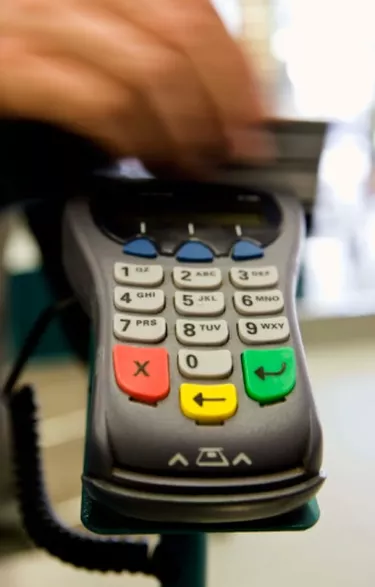
Electronic banking is a cost-effective way for financial institutions to do business, and most consumers enjoy the convenience of using a debit card at a point-of-sale terminal (checkout). Opting to purchase something with a debit card results in the transaction showing up temporarily as "pending" on your account. The amount of time it takes for a debit transaction clears varies, but usually isn't more than a few days.
How Debit Card Payments Work
Video of the Day
When you swipe your debit card, the merchant sends a request to your bank to determine whether your account is active and has enough money to cover the transaction. Your bank notes the amount the merchant has asked to verify. The bank does not automatically deduct the payment from your account, however, because at this point, all the merchant has done is ask if money is available. The merchant settles these outstanding transactions by sending a "batch request" to the acquirer, the bank that processes all the transactions for the merchant.
Video of the Day
Merchant Requests
Because merchants settle outstanding debit transactions through their acquirers, the basic rule of thumb regarding the duration of a pending debit transaction is that it will clear your account when the merchant makes a request for payment. Typically, merchants do this at the end of the day, so in theory, the closer your purchase is to the merchant's time of closing, the sooner the transaction will clear. However, settlement policies vary by merchant, so it's not unusual for a debit card transaction to remain pending for up to five days.
Bank Holds
Banks have individual policies on how long they will hold money for a merchant. Some banks hold money for just one day, but a 72-hour hold is fairly standard. If the merchant does not request its money by the end of the hold period, the hold "falls off" and the money related to the transaction once again shows as available in your account balance.
Cautions
Because debit transactions may "fall off" after the hold period, occasionally, mistakes happen with online banking. Often, banks list authorization holds in the "pending transactions" section of your online account. If the merchant doesn't request payment until after the hold period expires, the bank may represent the funds related to the transaction in the available balance, moving them from the "pending transactions" section. This can result in an overdraft if you rely only on the online or ATM balance, as you may not remember the transactions that have fallen off. It thus is important to track your debit card transactions online. Checking your bank's policy on debit card hold times when you open your account also can prevent you from misinterpreting your available balance.